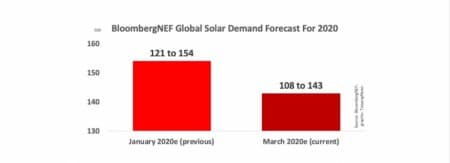With Saudi Arabia and Russia pumping flooding the market with oil as coronavirus threatens demand, oil prices have crashed below the $30 mark. It is a price crash that could have profound consequences for the global transition to cleaner energy.
Traditional logic suggests that a low oil price is bad news for renewables energy on several fronts. Firstly, it means lower gasoline and fuel prices which makes electric vehicles and biofuel less competitive. It also means that some oil companies could shift to focus on natural gas production, sending prices down and making solar and wind less competitive as sources of electricity. Finally, the economic impact of the oil price crash on both oil majors and governments is seen as a negative for renewable energy. If governments and oil majors are forced to cut spending, it is likely that renewable investments and subsidies will be among the first to go.
According to Fatih Birol, the head of the International Energy Agency, the oil price crash “will definitely put downward pressure on the appetite for a cleaner energy transition.” Meanwhile, BNEF has reduced its global solar demand significantly due to a looming economic slowdown.

And while renewable investment has been climbing rapidly over the last decade, we had already started to see a slowdown by 2018.

With all of this in mind, it is highly likely that the coronavirus and oil price war will have a short-term negative impact on the global energy transition.
In the long-term, however, there are plenty of reasons to believe that the most recent oil price crash could accelerate the adoption of clean energy. In the last few years, the shift towards conscious capitalism or ESG investing has been one of the most noticeable market trends. At the same time, renewable energy has become increasingly competitive, with some non-renewable projects struggling for approval due to fears of investments becoming stranded. Now, with oil prices below $30, oil and gas projects can no longer claim to offer higher returns than clean energy projects. Related: Is $10 Oil On The Horizon?
Oil demand and prices will bounce back, and new projects will undoubtedly be needed until a viable clean energy solution is developed. But a second major oil price crash in 6 years highlights the volatility of markets and the value of the stability provided by renewable solutions. With global sentiment shifting away from fossil fuels, clean energy growing increasingly competitive and oil market volatility once again in the spotlight – we may see oil majors and governments redoubling efforts to diversify energy investment. This is especially true in a world that is going to become increasingly vulnerable to pandemics.
Coronavirus has already cut global emissions in the short term, it may also mean our transition away from carbon-intensive energy sources is accelerated in the long term.
That being said, there is no viable alternative to meeting global energy demand at the moment. Yes, oil prices are volatile, burning oil is bad for the environment and it is partly responsible for much of the geopolitical instability we see on earth. But fossil fuels have driven social, economic and technological advancements throughout history and continue to be a vital part of human civilization. Coronavirus and the most recent oil price crash is just another reminder that we need to strive to diversify our energy sources as rapidly as possible.
Renewable energy is set to suffer in the short term, but this oil price crash may well serve as a turning point for the clean energy transition.
ADVERTISEMENT
By Josh Owens for Oilprice.com
More Top Reads From Oilprice.com:
- Saudi Arabia’s Oil War Could Bankrupt The Kingdom
- Largest Oil Glut In History Could Force Crude Prices Even Lower
- The Great U.S. Shale Decline Has Already Begun



















Renewables will get done, sure, and i am happy that is occurring, but the renewables crowd , not more than 6 months was saying they can compete with Nat Gas and a gallon of gasoline. Wrong, anytime they want to open the spigots, their will be movement from renewables back to the lowest cost producer. A fact of life, son.
I agree absolutly. Corona is a big landmark for the transition from oil to renewables.
Low oil prices reduce the avility of big oil to contain the renewable adoption in several fronts which in energy generation cost is now in parity with oil and gas with less time for protect development. Push from milenial investors away from Non renewables is also a big factors.
The damage comes not from low prices to consumers but from low income and higher risks to unvestors.
Wind does not blow all the time but is available and predictable everywhere and storage make it viable and available.
Renewables investment will accelerate and Oil & gas divestment will continue after the COVID-19 crisis and SAUDI, RUSSIA, SHELL market war.